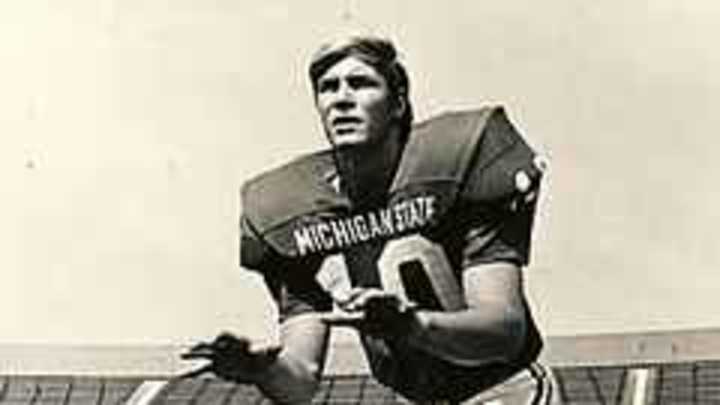Spartan football heroes Brad Van Pelt and John Pingel to be honored before Saturday's duel with Notre Dame

The tale of Brad Van Pelt goes something like this: Dean Howe didn't bother to cover Owosso (Mich.) basketball games because of the hype that surrounded its star player.
Van Pelt was said to have over 30 rebounds and 30 points in one game. Howe, a local sports writer at the time, didn't want to waste his time.
It didn't matter who the Trojans played - the notion that Van Pelt posted those kinds of numbers was absurd.
Well, after a few phone calls, and a visit to one of Van Pelt's games; Howe was a believer. He went to Van Pelt's next game, and watched the high school star record 42 rebounds.
"He was like a man among boys," Howe said, according to legend. "He was just so dominant."
The news spread as quickly as it could during those times. There were no such things as recruiting videos, Twitter, the Internet or Facebook. Highlights were written about, and if the player was lucky; maybe a few were shown on the local news. Van Pelt became an area icon nearly overnight.
Known for his 100-mph fastball, the Detroit Tigers and California Angels offered Van Pelt contracts while he was in high school. He declined.
Van Pelt's legacy at Michigan State began to write itself within a year of his arrival in East Lansing. The former small-town star was vaulted into a meteoric rise. He earned seven letters at Michigan State; started on the baseball, football and basketball teams, and gained two-time All-American status in the process.
He was the first defensive back in NCAA history to win the Maxwell Award, which is awarded annually to the nation's top college football player.
The 6-foot-5, 220-pound three-sport star finished his football career at Michigan State with 14 interceptions and 256 tackles.
Van Pelt was drafted in the second round of the 1973 NFL Draft by the New York Giants, and played for them for them until 1983. He spent the twilight of his pro career with the Los Angeles Raiders and Cleveland Browns, and was a five-time Pro Bowl selection.
The humble hero maintained a common touch. Van Pelt often returned to the town he called home: Owosso.
"He was just one of the guys," said Gary Webster. Webster coached Van Pelt and played alongside him in city baseball leagues in the 1960s and 70s. "He would shift to that much, much bigger stage and make us proud. He was a great guy. I miss him. I really do."
Webster said if Van Pelt were here today, he would be reluctant to receive Saturday's honor.
"I find it incredible," said Webster of Van Pelt's accomplishments. "But Brad would say 'You guys are making a mistake.'" Van Pelt never bragged or boasted, and Webster said that's a quality that many admired.
Van Pelt will be honored Sept. 18 prior to Michigan State's primetime battle with rival Notre Dame. His name will join the likes of Bubba Smith, George Webster, Don Coleman and former Michigan State president John Hannah in Spartan lore.
Van Pelt's time came too soon; he died of an apparent heart attack in February at age 57.
The "Ring of Fame" is a well-deserved honor for one of the greatest men to don the green and white.
Van Pelt's induction to esteemed company will be accompanied by the initiation of John Pingel to the exclusive fraternity.
"Brad Van Pelt and John Pingel are two players that didn't simply compete at the collegiate level - they excelled," said Spartan football coach Mark Dantonio.
Michigan State athletic director Mark Hollis compared Van Pelt and Pingel to two college football legends.
"Van Pelt has been labeled the modern day Jim Thorpe by his teammate Joe DeLamielleure, while Pingel has been described as the Doak Walker of his era," Hollis said. "As members of the College Football Hall of Fame, they truly rank among the greatest players in Spartan history."
Pingel played for Michigan State in what some consider the golden age of college football: The 1930s. He was a triple-threat, and starred as the Spartans' quarterback, halfback and punter from 1936-38. He led the Spartans to their first postseason game: A 6-0 Orange Bowl loss to Auburn in 1938.
Pingel's offensive prowess earned him a spot on Michigan State's all-time team, and he's widely regarded as one of the greatest signal-callers in school history alongside Steve Juday and Earl Morrall. He was drafted in the first round of the 1939 NFL Draft by the Detroit Lions, and spent just one season as a pro. Pingel passed away in 1999 at age 82.
"You don't get these types of athletes anymore," said Mark Niesen, a former teammate of Van Pelt's.
Both Pingel and Van Pelt are members of the College Football Hall of Fame: Pingel in 1968 and Van Pelt in 2001. But if you ask a Spartan, they're finally being honored where it matters most: Their alma mater.
